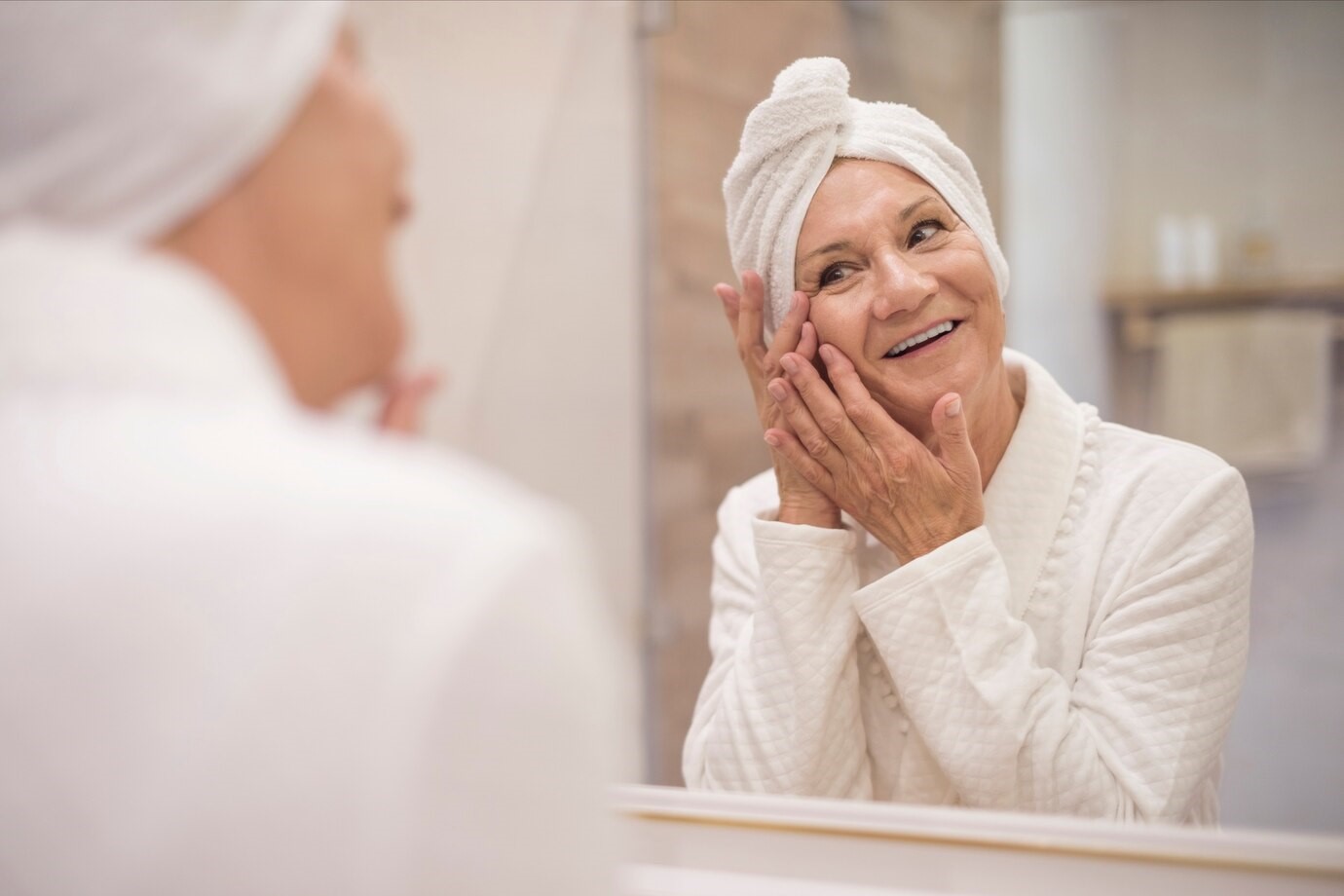Why SPF Is Important for Your Mature and Aging Skin

How frequently have you been reminded about the risks of not using sunscreen when venturing outdoors? Exposure to the sun can result in skin damage, the development of dark spots, and even lead to skin cancer.
Although receiving repetitive advice can be bothersome, overlooking it may pose greater dangers than anticipated. Sunscreen is essential for mature and aging skin; everyone should use it, regardless of skin type.
How Does the Sun Impact Mature and Aging Skin?
Excessive sun exposure is the predominant factor contributing to visible mature and aging skin, surpassing the impact of all other factors combined. The primary culprits are UV rays from the sun, which play a central role in causing wrinkles, pigmentation issues, sun spots, diminished skin elasticity, the deterioration of skin texture, and various other indicators of aging.
A number of scientific assessments indicate that a substantial 80-90% of one’s perceived age, relative to their actual age, is attributable to the extent of sun exposure. This correlation has been consistently demonstrated across diverse regions globally over the years and through various clinical studies.
Here are 8 reasons why you need SPF in your skincare routine:
1. Maintaining a Healthy Skin Barrier
Mature and aging skin often experience a weakened skin barrier, which can lead to increased dryness and sensitivity. SPF helps to maintain a healthy skin barrier by preventing UV damage and reducing the risk of moisture loss. Sunscreen protects the skin from immediate damage and contributes to long-term skin health. By preventing sun damage, sunscreen helps maintain the skin’s integrity, hydration, and overall appearance.
2. Reduced Risk of Skin Cancer
Prolonged exposure to UV radiation increases the risk of skin cancer, including melanoma. Regular use of SPF can significantly reduce this risk by providing a barrier against harmful UV rays. SPF primarily indicates the level of protection against UVB radiation, which is responsible for causing sunburn and can contribute to the development of skin cancer. By preventing sunburn, SPF helps reduce the damage caused by UVB rays and lowers the risk of skin cancer associated with these rays.
3. Minimizing Hyperpigmentation
Existing hyperpigmentation can worsen with sun exposure, as mature and aging skin is more prone to hyperpigmentation. Sunscreen acts as a preventive measure, reducing the likelihood of developing new areas of hyperpigmentation. Such as age spots and dark spots. UV exposure can exacerbate these issues. Sunscreen with a high Sun Protection Factor (SPF) plays a pivotal role in mitigating these concerns.

4. Prevention of Wrinkles and Fine Lines
Exposure to UV rays accelerates the skin’s aging process. Sun damage can lead to the development of wrinkles, fine lines, age spots, and loss of skin elasticity. SPF helps to protect the skin from the sun’s harmful ultraviolet (UV) rays, which are a leading cause of premature aging.
5. Preventing Sunburns
Preventing sunburns in mature and aging skin involves using sunscreen and adopting a thorough approach to sun protection. Older skin tends to be more sensitive; prolonged sun exposure can lead to painful sunburns. SPF protects the skin from the harmful effects of UVB rays, reducing the risk of sunburn.
6. Hydration and Moisture Retention
Sun exposure can lead to dryness and dehydration, making mature and aging skin more prone to fine lines and wrinkles. SPF-containing products often include moisturizing agents that help keep the skin hydrated.
Many SPFs also include other hydrating ingredients, such as hyaluronic acid, glycerin, or ceramides. These compounds can help improve the skin’s moisture balance, providing a plumping effect.
7. Preservation of Collagen
Preserving collagen and elastin is crucial for maintaining the skin’s elasticity, firmness, and overall structure. These proteins are essential components of the skin’s connective tissue, and their degradation is a natural part of aging. UV rays can break down collagen and elastin.
Using SPF helps preserve these proteins and promotes healthier, more youthful-looking skin.
8. Improved Skincare Results
If you use anti-aging products or treatments for your mature and aging skin, protecting your skin with SPF increases the efficacy of these products. Sun damage can compromise the benefits of other skincare efforts, so incorporating SPF into your routine ensures a comprehensive approach to skin health.
Additionally, combining sun protection with other skincare practices, such as moisturizing and using anti-aging products, can further support the health and appearance of mature and aging skin.

End note
To effectively protect mature and aging skin, it’s recommended to use a broad-spectrum sunscreen with a high SPF value daily, even on cloudy days, and reapply it every two hours when exposed to the sun for an extended period. Regular use of sunscreen can contribute to maintaining the health and appearance of mature and aging skin.
Explore our website now and elevate your skincare routine. Embrace the glow, and nurture your skin.
